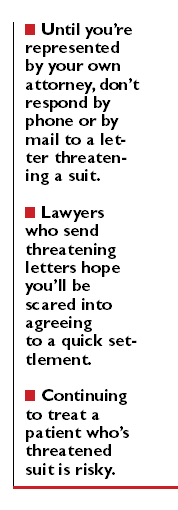Article
Malpractice Consult
Lawsuit threat? Respond carefully
Q I just received a letter from a plaintiff's attorney accusing me of gross negligence and demanding the records for one of my patients. The attorney says he's willing to agree to a "reasonable" settlement, but threatens to sue me if I don't respond within 60 days. What should I do?
Also, the patient wants to continue coming in for treatment. Should I agree to see her?
A Whatever you do, don't respond to the letter right away. Our legal system is adversarial. That plaintiff's attorney is not your friend, and his letter means he intends to sue you. Until you're represented by your own attorney, don't respond by phone or by mail, and don't offer to have a nice little private chat to explain what really happened. If you do, the attorney will use whatever you say against you in court. Remember, your expertise is in medicine, not law.

So resist the natural urge to "enlighten" the attorney who sent you the letter. Instead, notify your malpractice carrier, send it a copy of the letter, and then start gathering your records for what will most likely become a lawsuit. Assuming the plaintiff's attorney has enclosed a signed waiver from the patient (or her parent if she's a minor) allowing for their release, you may then provide the requested records-with your carrier's approval.
Make sure you send copies, not originals. And there's no need to rush, because there's no law that requires you to respond to such a letter in any given time period-regardless of whatever "time limit" the lawyer cites. The clock only starts ticking once a lawsuit is actually filed.
As for continuing to treat the patient, that could be risky. Her lawyer may have told her to make an appointment in order to "troll" for statements or admissions of liability. If she does, and tries to discuss the details of the case, you might ask her if she's carrying a hidden recorder for that purpose. Whatever you do, be very careful about what you say. In fact, I'd advise having a nurse present as a witness and to take notes.
To avoid such an awkward en-counter, you might call or write the patient and say: "Mrs. Smith, one of the necessary ingredients for a successful doctor-patient relationship is trust. Since you've decided to sue me, you've apparently lost that trust in me and in my judgment. I therefore feel it would be inappropriate for me to keep treating you, and I think you'd be better off seeing another physician."
If the patient insists on discussing the case, be professional. Don't expect to change the patient's mind about suing you by trying to explain "what really happened." Don't say something like, "You know, this suit could affect my malpractice rates," or "How could you sue me after I've treated you and your family for so many years?" And never blame the patient for what happened. Jurors don't like that attitude.
Occasionally, the patient may say: "Trust me, Doc, I really like you, and I don't blame you for what happened. My lawyer made me sue you." That's great news, because it means you've just won your case.





